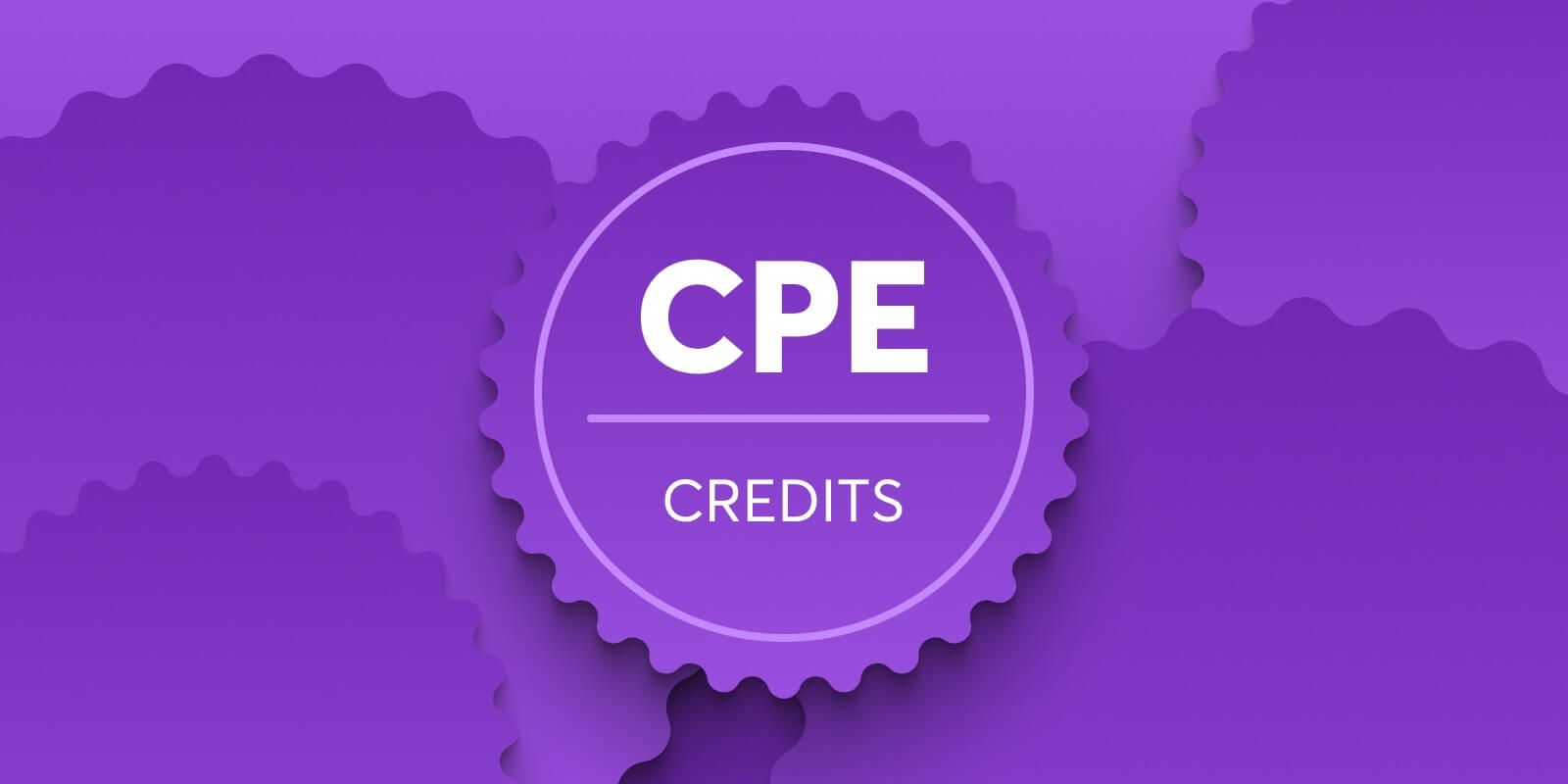

Finance
What Is A CPE In Accounting
Published: October 8, 2023
Learn all about CPE in accounting and how it can benefit your finance career. Gain valuable insights and stay up to date with the latest developments in finance.
(Many of the links in this article redirect to a specific reviewed product. Your purchase of these products through affiliate links helps to generate commission for LiveWell, at no extra cost. Learn more)
Table of Contents
Introduction
Accounting is a critical field that requires professionals to stay updated with the latest industry trends, regulations, and best practices. Continuous Professional Education (CPE) plays a vital role in ensuring that accountants maintain their knowledge and skills throughout their careers.
CPE in accounting refers to the ongoing education and training that accountants undertake to enhance their professional competence. It encompasses a wide range of learning activities, including courses, seminars, workshops, and conferences, designed to broaden their understanding of accounting principles, financial reporting standards, taxation laws, and other relevant areas.
In today’s fast-paced business environment, where regulations change rapidly and new technologies emerge, accountants must stay abreast of the latest developments to provide accurate financial information, mitigate risks, and make informed decisions. CPE enables accounting professionals to expand their knowledge base, develop new skills, and adapt to the evolving demands of the industry.
Whether you are an aspiring accountant or a seasoned professional, investing in CPE is crucial for your career growth and success in the accounting field. It not only enhances your expertise but also demonstrates your commitment to professional development and maintaining the highest standards of integrity.
In the following sections, we will explore the definition of CPE in accounting, the importance of CPE, the requirements for accountants, the types of CPE courses available, the benefits, and the challenges faced in completing CPE.
Definition of CPE in Accounting
Continuous Professional Education (CPE) in accounting refers to the ongoing learning activities that accountants engage in to maintain and enhance their professional competence. It is a crucial component of the accounting profession, ensuring that accountants stay up-to-date with the ever-evolving industry standards, regulations, and practices.
CPE encompasses a wide range of educational activities, including seminars, workshops, conferences, webinars, online courses, and self-study programs. These activities are designed to expand accountants’ knowledge base, improve technical skills, and enhance their understanding of accounting principles, regulations, and industry trends.
Accounting CPE is not only about gaining technical knowledge but also focuses on developing a broad set of competencies, including critical thinking, problem-solving, communication, and ethical decision-making. These skills are essential for accountants to provide accurate financial information, analyze financial data, adhere to professional standards, and ensure compliance with applicable laws and regulations.
The requirements for CPE in accounting vary depending on the professional designation or certification held by the accountant. For example, Certified Public Accountants (CPAs) are typically required to fulfill a certain number of CPE hours every year to maintain their licenses. Similarly, other accounting certifications, such as Certified Management Accountant (CMA) and Certified Internal Auditor (CIA), have their own CPE requirements.
It is important to note that CPE in accounting is not limited to technical knowledge and skills. It also encompasses professional values and ethics, as accountants need to maintain high professional standards and integrity. CPE programs often include courses on professional ethics, fraud prevention, risk management, and corporate governance to ensure that accountants adhere to ethical practices in their roles.
In summary, CPE in accounting is a continuous learning process that enables accountants to stay updated with industry developments, enhance their technical skills, and uphold professional ethics. By investing in CPE, accountants can provide superior financial services, stay competitive in the job market, and deliver value to their clients and organizations.
Importance of CPE in Accounting
Continuous Professional Education (CPE) is of utmost importance in the field of accounting. As the accounting industry continues to evolve, staying updated with the latest knowledge and skills is crucial for accountants to provide accurate financial information, ensure compliance with regulations, and make informed decisions. Here are several key reasons why CPE is essential for accountants:
- Stay Updated: The accounting field is dynamic, with changing regulations, reporting standards, and technologies. CPE allows accountants to stay abreast of these changes and ensures that they have the latest information to perform their roles effectively. It helps them understand and comply with new tax laws, accounting principles, and financial reporting requirements.
- Enhance Technical Skills: CPE provides opportunities for accountants to develop and refine their technical skills. It offers specialized courses on topics such as auditing, taxation, financial analysis, and information technology. By honing their skills through CPE, accountants can excel in their roles and contribute to the success of their organizations.
- Adapt to Technological Advancements: Technology continues to reshape the accounting profession. CPE helps accountants stay current with emerging technologies, such as artificial intelligence, automation, and financial software. By understanding these advancements, accountants can leverage technology to improve efficiency, accuracy, and decision-making in their work.
- Expand Knowledge Base: CPE offers a wide range of subjects and specializations beyond the core accounting principles. Accountants can explore areas such as forensic accounting, sustainability reporting, business valuation, and risk management. This expanded knowledge allows them to provide additional value to their clients and organizations.
- Meet Regulatory Requirements: Many professional accounting bodies and licensing agencies require accountants to complete a certain number of CPE hours annually or over a specific period. Meeting these requirements is essential to maintain professional certifications or licenses. Failure to comply with CPE obligations may result in penalties or the loss of professional status.
- Network and Collaboration: CPE provides opportunities for accountants to network and collaborate with peers, industry experts, and thought leaders. Conferences, seminars, and workshops offer platforms for sharing knowledge, discussing challenges, and exchanging insights. This networking can lead to valuable connections, career opportunities, and access to a support network.
In summary, CPE is vital for accountants to stay relevant, enhance their skills, meet professional requirements, adapt to technological advancements, and expand their knowledge base. By investing in continuous education, accountants can thrive in the ever-changing accounting landscape and provide exceptional services to their clients and employers.
CPE Requirements for Accountants
Accountants are often required to fulfill certain Continuing Professional Education (CPE) requirements to maintain their professional certifications, licenses, or memberships with accounting bodies. The specific CPE requirements vary depending on the jurisdiction and the designation or certification held by the accountant. Here are the key factors to consider regarding CPE requirements for accountants:
- Hours of CPE: Most professional accounting organizations have specific annual or triennial CPE hour requirements. These requirements typically range from 40 to 120 hours, with variations based on the jurisdiction and the designation held. Accountants must complete the required hours within the defined time period to maintain their professional status.
- Subject Areas: CPE requirements often include mandatory subject areas that accountants must cover during their education. These subject areas usually include ethics, accounting standards, taxation, and auditing. The purpose is to ensure that accountants maintain a well-rounded knowledge base and stay updated in critical areas of the profession.
- Approved Providers: Most accounting organizations have a list of approved CPE providers. Accountants must complete their CPE courses or programs through these approved providers to meet the requirements. This ensures that the education received by accountants meets the quality standards set by the accounting organization.
- Delivery Formats: CPE courses can be delivered in various formats, including in-person seminars, webinars, online self-study programs, conferences, and workshops. Accountants have the flexibility to choose the delivery format that best fits their schedule and learning preferences. However, it is important to ensure that the chosen format is recognized as acceptable for CPE credits by the accounting organization.
- Reporting and Documentation: Accountants are required to accurately report their completed CPE hours to the relevant accounting organization. This may involve submitting transcripts, certificates, or other documentation as proof of completion. It is essential to maintain proper records of completed CPE activities for future reference and auditing purposes.
- Exemptions and Extensions: In certain cases, accountants may be eligible for exemptions or extensions for their CPE requirements. Exemptions may be granted for reasons such as illness, military service, or temporary leaves. Extensions can be requested if an accountant is unable to fulfill the requirements within the prescribed time. However, these exemptions and extensions are subject to the specific policies and regulations set by the accounting organization or licensing authority.
It is crucial for accountants to stay informed about the CPE requirements specific to their jurisdiction and professional designation. By fulfilling the CPE requirements, accountants demonstrate their commitment to ongoing professional development and ensure that they are equipped with the knowledge and skills necessary to excel in their roles.
Types of CPE Courses for Accountants
Continuous Professional Education (CPE) offers a wide range of courses and learning opportunities for accountants to enhance their knowledge, skills, and professional development. These courses help accountants stay updated with industry trends, regulations, and best practices. Here are some common types of CPE courses available for accountants:
- Technical Accounting Courses: These courses focus on expanding accountants’ technical knowledge and skills in areas such as financial accounting, managerial accounting, auditing, taxation, and accounting software. They help accountants stay current with changes in accounting standards, tax laws, and financial reporting requirements.
- Ethics and Professional Conduct: Ethics courses delve into the professional values and ethical responsibilities of accountants. They provide guidance on maintaining integrity, confidentiality, objectivity, and professional skepticism. These courses help accountants navigate ethical dilemmas and ensure compliance with ethical standards.
- Specialized Accounting Fields: Accountants can choose to specialize in various fields such as forensic accounting, internal auditing, sustainability reporting, fraud examination, or mergers and acquisitions. CPE courses in these specialized areas provide in-depth knowledge and skills to excel in these niche fields.
- Information Technology: With the increasing integration of technology in accounting, CPE courses related to information technology are crucial. These courses cover topics such as data analytics, cybersecurity, artificial intelligence, cloud computing, and accounting software systems. They help accountants leverage technology to improve efficiency and effectiveness in their roles.
- Leadership and Communication: Accountants also require soft skills to excel in their roles. CPE courses on leadership, communication, conflict resolution, and presentation skills help accountants develop effective communication and management abilities. These skills enable accountants to collaborate effectively, lead teams, and communicate financial information clearly to stakeholders.
- Industry-Specific Knowledge: Certain industries have unique accounting practices and regulations. CPE courses tailored to specific industries, such as healthcare, real estate, non-profit organizations, or financial services, provide industry-specific knowledge and insights. These courses help accountants understand industry-specific challenges, regulations, and reporting requirements.
CPE courses can be delivered through various methods, including in-person workshops, webinars, online self-study programs, and conferences. Accountants can choose the format that best suits their learning preferences, schedule, and budget.
When selecting CPE courses, accountants should ensure that the courses are offered by approved providers recognized by their accounting organization. This ensures the courses meet the necessary quality standards and are eligible for CPE credits.
By diversifying their CPE courses and selecting topics aligned with their career goals, accountants can continuously expand their knowledge and skills, stay relevant in the accounting industry, and position themselves for career advancement.
Benefits of CPE in Accounting
Continuous Professional Education (CPE) provides numerous benefits for accountants in terms of career advancement, professional growth, and staying relevant in the field. Here are some key benefits of investing in CPE:
- Enhanced Knowledge and Skills: CPE allows accountants to expand their knowledge base and develop new skills. By staying updated with the latest industry trends, regulations, and best practices, accountants can offer more accurate financial information, improve decision-making, and provide valuable insights to their clients or employers.
- Competitive Edge: In a highly competitive job market, CPE gives accountants a competitive edge. Employers value accountants who demonstrate a commitment to continuous learning and professional development. By showcasing their up-to-date knowledge and skills, accountants increase their chances of securing better job opportunities, promotions, or higher compensation.
- Professional Credibility: Completing CPE requirements demonstrates an accountant’s commitment to maintaining professional competence and upholding ethical standards. This enhances their professional credibility and reputation among clients, employers, and peers. Accountants with a strong track record of CPE participation are seen as more trustworthy, reliable, and capable of delivering high-quality services.
- Networking and Collaboration: CPE courses often provide networking opportunities, such as conferences, seminars, and workshops. These events allow accountants to connect and collaborate with peers, industry experts, and thought leaders. Networking can lead to valuable connections, mentorship opportunities, business partnerships, and access to a support network for professional advice and guidance.
- Adaptability to Changing Landscape: The accounting profession is constantly evolving due to advancements in technology, changes in regulations, and shifting business environments. CPE enables accountants to stay updated and adapt to these changes. By learning about emerging technologies, new reporting standards, and industry developments, accountants can remain proactive and effectively navigate challenges.
- Personal Growth: CPE not only enhances professional knowledge and skills but also promotes personal growth. It encourages accountants to think critically, solve complex problems, and broaden their perspectives. Continuous learning fosters personal development, self-confidence, and a sense of achievement, leading to overall career satisfaction.
- Meeting Regulatory Requirements: Many accounting organizations and licensing authorities have mandatory CPE requirements to maintain professional certifications or licenses. By fulfilling these requirements, accountants ensure compliance with regulations and avoid penalties or loss of professional status.
Overall, CPE plays a vital role in the accounting profession by keeping accountants current, competitive, and equipped with the necessary knowledge and skills to succeed. By investing in continuous education and professional development, accountants can elevate their careers, deliver exceptional services, and contribute to the growth and success of their organizations.
Challenges in Completing CPE
While Continuous Professional Education (CPE) offers numerous benefits, accountants may encounter certain challenges when attempting to fulfill their CPE requirements. Here are some common challenges in completing CPE:
- Time Constraints: Accountants often have demanding work schedules, making it challenging to find the time to complete CPE courses. Balancing client deadlines, daily responsibilities, and personal commitments with CPE requirements can be a significant challenge.
- Financial Constraints: Some CPE courses and programs can be costly, especially those offered by reputable providers or specialized topics. Accountants with limited financial resources may find it difficult to allocate funds for CPE courses, particularly if their employers do not cover the expenses.
- Course Availability: Access to a wide range of CPE courses may be limited in certain geographic regions or for specific specialization areas. Accountants working in remote areas or pursuing niche fields may struggle to find relevant CPE courses that fully meet their professional needs.
- Relevance and Quality: Not all CPE courses may be equally valuable or relevant to an accountant’s specific needs and interests. It can be challenging to select courses that provide practical knowledge, up-to-date information, and high-quality instruction from credible providers.
- Maintaining Motivation: Pursuing CPE requires self-motivation and commitment. Accountants may find it challenging to stay motivated, particularly when balancing work and personal responsibilities. Without proper motivation, completing CPE requirements can become a burden rather than a meaningful learning experience.
- Keeping Pace with Changing Requirements: CPE requirements frequently change to align with new industry developments, regulations, and standards. Accountants must stay informed about these changes and ensure that they fulfill the updated requirements within the specified timeframe. Keeping up with evolving requirements can be challenging and time-consuming.
- Flexibility and Learning Preferences: Each accountant has unique learning preferences and constraints. CPE courses may not always align with an accountant’s preferred learning format, such as in-person seminars, webinars, or online self-study programs. Lack of flexibility in course delivery can make it challenging for accountants to find suitable options.
Addressing these challenges requires proactive planning, effective time management, financial planning, and staying informed about available courses and providers. Accountants can overcome these challenges by seeking employer support, exploring alternative learning formats, leveraging online resources, and prioritizing their professional development.
Despite the challenges, the benefits of completing CPE far outweigh the obstacles. It is crucial for accountants to recognize the importance of continuous learning and professional growth, and to actively seek ways to overcome challenges in order to maintain their professional competence and excel in their careers.
Conclusion
Continuous Professional Education (CPE) is essential for accountants to thrive in the ever-evolving field of accounting. By investing in ongoing education and professional development, accountants can stay updated with industry trends, enhance their knowledge and skills, and maintain their professional competence.
CPE provides various benefits for accountants, including the opportunity to expand their knowledge, sharpen their technical skills, and stay competitive in the job market. It promotes personal growth, professional credibility, and networking opportunities, enabling accountants to excel in their roles and advance their careers.
While there may be challenges in completing CPE, such as time constraints, financial limitations, and course availability, these obstacles can be overcome with careful planning, motivation, and resourcefulness. It is crucial for accountants to stay informed about CPE requirements, select relevant and high-quality courses, and make the necessary commitments to complete their CPE obligations.
Ultimately, by actively engaging in CPE, accountants demonstrate their commitment to professional development, uphold ethical standards, and adapt to the changing landscape of the accounting profession. Continuous learning through CPE is not just a requirement; it is a mindset that reflects a dedication to providing exceptional financial services, making informed decisions, and delivering value to clients and employers.
In conclusion, CPE in accounting is a valuable investment that pays dividends throughout an accountant’s career. By continuously expanding their knowledge, honing their skills, and staying abreast of industry developments, accountants can position themselves as trusted professionals and contribute to their own success as well as the growth of their organizations.














